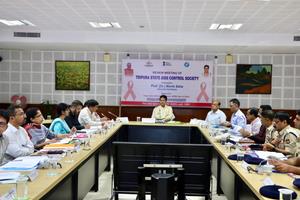
Tripura CM Launches Campaign To Reinforce Fight Against Rising HIV Cases
Presiding over a review meeting on the measures taken against HIV/AIDS in the state, the Chief Minister said the state government has already approved setting up of drug rehabilitation centres in all the eight districts to deal with people suffering from drug addiction.
Saha, who also holds the Health and Family Welfare portfolio, said that to curb cases of HIV/AIDS and to undertake campaigns against the infectious disease, teachers must take greater responsibility.
Health Secretary Gitte Kirankumar Dinkarrao said at the meeting that Red Ribbon clubs have been set up in 31 colleges and higher secondary schools to undertake campaigns against the spread of HIV/AIDS.
Additionally, 13 voluntary organisations were engaged to ensure extensive campaigns against HIV/AIDS, he said.
Acting on a PIL, the Tripura High Court recently issued notices to both the state and Central government seeking comprehensive reports on the rising HIV cases in the state within two weeks.
The PIL was taken up suo-moto by the high court after reports of an alarming rise in HIV cases and deaths, particularly among the students and the youth of the state.
A division bench of the high court comprising Chief Justice Aparesh Kumar Singh and Justice Arindam Lodh took up the PIL following a letter from Justice T. Amarnath Goud, a judge of the high court, which highlighted the gravity of the situation.
Between April 2007 and May 2024, 828 students registered as PLHIV (People Living With HIV), 47 of whom died during the 17 years.
The Project Director of Tripura State AIDS Control Society, Samarpita Dutta, said that in 2022-23, 67 persons, including two students, died, while in 2023-24, 44 people died after being infected by HIV.
Presently, Tripura has approximately 8,000 known HIV-positive cases, though experts believe the figure represents only a fraction of the actual numbers, as many cases remain untracked.
The state recorded its first HIV case in 1996. Since then, there has been a marked increase in the number of infections, especially among high-risk groups such as youths using intravenous drugs, female sex workers, truck drivers, migrants, and gay people.

Legal Disclaimer:
MENAFN provides the
information “as is” without warranty of any kind. We do not accept
any responsibility or liability for the accuracy, content, images,
videos, licenses, completeness, legality, or reliability of the information
contained in this article. If you have any complaints or copyright
issues related to this article, kindly contact the provider above.

















Comments
No comment